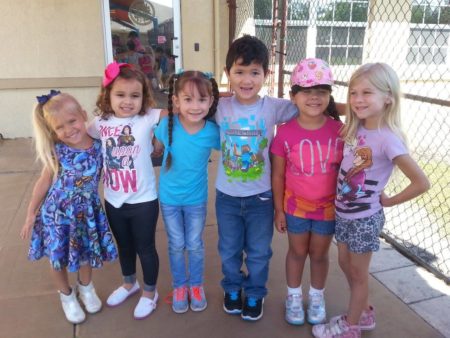
Preschoolers thrive in an environment where each and every child is an important part of the community. Preschool, for most children, is the very first experience with spending many hours a day with a large group of peers. This setting fosters the ability to celebrate individual differences & similarities so children learn to value themselves, appreciate their peers, and develop meaningful and significant relationships with one another.
Much like us as adults, young children cannot be expected to be friends with everyone they come in contact with but there are ways to help & encourage them to develop some strong, lasting friendships and to cooperate with their peer group in preschool. While many children will make friends and learn how to cooperate with their peers naturally, our preschool experts are here to offer some suggestions for things you can do at home to help.
Tip 1: Model Appropriate Behavior
As your child develops, they learn important social skills by copying the adults they see around them. This makes it extremely important for parents to model the behavior they would like to see in their child and be aware of their reactions to everyday social situations such as making unkind comments or speaking in anger. Try to avoid situations like these in your own social setting when your child is around and instead opt to offer a helping hand to other people in need and speak kindly about the people you meet.
Tip 2: Encourage Positivity
Most people, children AND adults, tend to prefer the company of positive people since positivity tends to be contagious. Positive people who feel good about themselves generally make others feel good, too. You can encourage your child to be positive by discussing problems and talking about how to turn a situation from a negative to a positive with a few changes in thinking. If your child feels like one of their classmates doesn’t like them because they won’t play with them, encourage them to spend time with peers who DO enjoy playing with them.
Tip 3: Find a Shared Interest
Most good friendships are based around some shared interests like music, sports, arts & crafts and movies. It is important to remind your child that not all interests will be shared, but good friends don’t have to enjoy everything their peer does. Giving your child lots of opportunities to try different activities will help them to find out what their interests are and build their confidence to try new things.
Tip 4: Encourage Conversations
Some young children find it difficult to make friends because they don’t have the confidence or communication skills to take the first step. Starting a conversation can be nerve-wracking and your child may avoid it to avoid embarrassment. You could help them by role playing opening sentences to help your child get the conversation started. Encourage them to start with a compliment or by asking a friendly question. Once a child gets a conversation started, they have no problem keeping it up.
Tip 5: Develop Good Manners
The importance of good manners in developing good relationships between young children is often overlooked. Remind your children of the importance of saying things like ‘please’ and ‘thank you’ and how to greet adults and other children in different situations. This also includes learning how to join in a conversation politely, without interrupting or leaning how to deal with a difference of opinion in a polite and respectful way.
Here at Kids ‘R’ Kids Avalon Park, we foster an environment where children can learn both academic and social skills. Our teachers and award-winning curriculum encourage children to cooperate and work together with their peers to develop meaningful relationships. We’d love to have you come visit our beautiful campus and find out everything that KRK Avalon Park has to offer preschoolers, Pre-K students, and even school-aged children.